
A prophet? Not.
I suspect this is the popular idea of a prophet: a fortune-teller, a sooth-sayer.
No. Prophets are spokesmen for God, through whom God has had all manner of things to say, often in judgment, and also often warnings about the future.
Why a Post about Prophets today?
1 Because during December our Orthodox calendar provides us with a whole slew of Prophets. * In this first week, one after another: December 1 – Nahum, December 2 – Habbakuk, December 3 – Zephaniah. Later in the month on December 16 come Haggai, and on the 17th the Great Prophet Daniel.
- So far as I know, only Orthodox Christians commemorate the Old Testament prophets liturgically. Western Christians read and honor the Prophets, but for some reason they never commemorate them in their services. (Does anyone here present know the reason?)
2 Because Christmas is upon us, our celebration of the Nativity of our Lord and God and Savior Jesus Christ – and (in one way or another, directly or indirectly, sometimes quite obscurely) the Church holds that all true Prophets prepared the way for the coming of Christ. As we Orthodox understand it, the whole Old Testament prepared the way for the Incarnation. This is why we Orthodox list Abraham and Moses and King David among the prophets.
So we’re going to take a look at prophecy in general: This week’s Prophets, What makes a true Prophet? True Prophets and false prophets, in the Old Testament and the New Testament, with a few stories to illustrate the point. Finally: Are there any prophets today?
This Week’s Prophets

December 1: Nahum (Naoum) is one of the minor Prophets. We know nothing of his background, except that he was born in Alqosh, likely the town of that name in what is now northern Iraq. Some think the town of Capernaum in Israel was named after him. Writing in the Seventh Century BC, in three short chapters he spoke of the vengeance of God: prophesied the destruction of the Assyrian Empire and its capital city Nineveh: “Woe to the bloody city! It is all full of lies and robbery.” “She is empty, desolate, and waste! The heart melts, and the knees shake; Great pain is in every side, And all their faces are drained of color.” “Behold, I am against you,” says the Lord of hosts, “I will burn [your chariots in smoke, and the sword shall devour your young lions; I will cut off your prey from the earth, 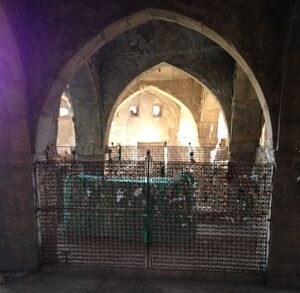 and the voice of your messengers shall be heard no more.”
and the voice of your messengers shall be heard no more.”
Indeed Nineveh fell to the Medes and Babylonians (Chaldeans) in 612 BC; the city was destroyed and never regained its earlier significance. What is said to be Nahum’s tomb, in Alqosh, was protected by the Jewish population till they were expelled in 1948, after which it began to fall into ruin. It barely escaped being destroyed by ISIS radicals in 2017, but is now being restored by a US-led team.
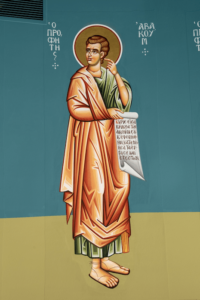
December 2: Habbakuk (pronounced Habakkuk) was another minor Prophet who also wrote just before the Babylonian conquest. Nothing is known of his background. This is a book well worth reading. In three short chapters, beautifully written, he prophecies what is coming: “For I will work a work in your days which you would not believe, though it were told you. For indeed I am raising up the Chaldeans, a bitter and hasty nation which marches through the breadth of the earth, to possess dwelling places that are theirs. They are terrible and dreadful…” However, he concludes with one of the most beautiful testimonies to faith in God found anywhere in the Scriptures: “Though the fig tree may not blossom, Nor fruit be on the vines; Though the labor of the olive may fail, And the fields yield no food; Though the flock may be cut off from the fold, And there be no herd in the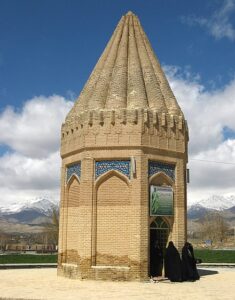 stalls – Yet I will rejoice in the Lord, I will joy in the God of my salvation. The Lord God is my strength; He will make my feet like deer’s feet, And He will make me walk on my high hills.” Jews believe Habakkuk’s tomb is about twelve miles of Mount Tabor, where a modern building protects it. However, Iranians believe he was taken by the Persians to Ectabana in Iran, where a large monument, with writing both in Pharsi and in Hebrew commemorates him.
stalls – Yet I will rejoice in the Lord, I will joy in the God of my salvation. The Lord God is my strength; He will make my feet like deer’s feet, And He will make me walk on my high hills.” Jews believe Habakkuk’s tomb is about twelve miles of Mount Tabor, where a modern building protects it. However, Iranians believe he was taken by the Persians to Ectabana in Iran, where a large monument, with writing both in Pharsi and in Hebrew commemorates him.
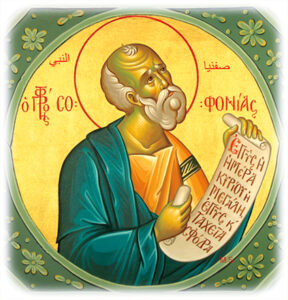
Zephaniah (Sophonias), another of the minor Prophets, wrote from Jerusalem about the year 610 BC, when the people had turned away from the Lord to paganism. “The word of the Lord which came to Zephaniah … in the days of Josiah the son of Amon, king of Judah: “I will utterly consume everything from the face of the land,” says the Lord; “I will consume man and beast; I will consume the birds of the heavens, The fish of the sea, And the stumbling blocks along with the wicked. I will cut off man from the face of the ]land,” says the Lord. I will stretch out My hand against Judah, And against all the inhabitants of Jerusalem. I will cut off every trace of Baal from this place, The names of the idolatrous priests with the pagan priests—Those who worship the host of heaven on the housetops; Those who worship and swear oaths by the Lord, But who also swear by Milcom; Those who have turned back from following the Lord, And have not sought the Lord, nor inquired of Him.”Be silent in the presence of the Lord God;For the day of the Lord is at hand.” (That passage gives me the holy chills.) What he foresaw came to pass when Jerusalem was destroyed by the Babylonians in 587 BC and the people taken into Babylonian Captivity for 75 years.
But at the end Zephaniah foresaw hope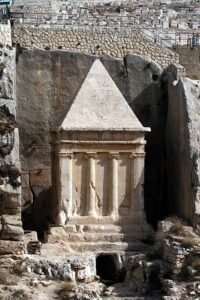 : “Behold, at that time I will deal with all who afflict you; I will save the lame, And gather those who were driven out; I will appoint them for praise and fame In every land where they were put to shame. At that time I will bring you back, Even at the time I gather you; For I will give you ]fame and praise Among all the peoples of the earth, When I return your captives before your eyes,” says the Lord.
: “Behold, at that time I will deal with all who afflict you; I will save the lame, And gather those who were driven out; I will appoint them for praise and fame In every land where they were put to shame. At that time I will bring you back, Even at the time I gather you; For I will give you ]fame and praise Among all the peoples of the earth, When I return your captives before your eyes,” says the Lord.
His tomb is an ancient stone monument in Jerusalem.
What makes a True Prophet
True Prophets delivered not their own opinions (“Here’s what I think…) but rather what God had told them. They usually began their prophecies saying: “Thus says the Lord:…”
For example: “Then the word of the Lord came to me, saying: ‘Before I formed you in the womb I knew you; Before you were born I sanctified you; I ordained you a prophet to the nations.” Jeremiah 1:4-5 ”
How can we recognize who is a true Prophet and who is not? Here is the first test given in the Holy Scriptures: “How shall we know the word which the Lord has not spoken?— when a prophet speaks in the name of the Lord, if the thing does not happen or come to pass, that is the thing which the Lord has not spoken; the prophet has spoken it presumptuously; you shall not be afraid of him.” Deuteronmy 18:21-22 In other words we never know till later!
This seems an inadequate test. There needed to be some way so people could figure out now, not later, whether the person speaking was a true Prophet. For example: True Prophets have always spoken of God’s justice and judgment, whether people wanted to hear it or not. They never feared to speak the truth, especially to those in power. When God’s people were suffering, true Prophets usually have given them hope, have foreseen good things coming. In Old Testament times, many Prophets predicted the coming of a Messiah: a true King who would rule in justice, a true Priest who would by His sacrifice finally unite Heaven and earth, God and mankind, again.
True Prophets often did foretell the future, but conditionally. It all depended on the hearers’ response. Jeremiah laid this out directly: “Then the word of the Lord came to me: … ‘Just like the clay in the potter’s hand, so are you in my hand, O house of Israel. At one moment I may declare concerning a nation or a kingdom, that I will pluck up and break down and destroy it, but if that nation, concerning which I have spoken, turns from its evil, I will change my mind about the disaster that I intended to bring on it. And at another moment I may declare concerning a nation or a kingdom that I will build and plant it, but if it does evil in my sight, not listening to my voice, then I will change my mind about the good that I had intended to do to it.” Jeremiah 18:5-10

Jonah was a Prophet who proclaimed the Word of God to the people of Nineveh. After first refusing the call of God and running away and as a result getting swallowed, then regurgitated, by a big fish, he finally gathered his courage and went to the wicked Ninevites. “He cried out and said, ‘Yet forty days, and Nineveh shall be overthrown!'” Jonah 3:4 Much to Jonah’s surprise the Ninevites repented and changed their ways. “Then God saw their works, that they listened and turned from their evil way; and God relented from the disaster that He had said He would bring upon them, and He did not do it.” Jonah’s reaction? “It displeased Jonah exceedingly, and he became angry…” Jonah 4:1 Angry at God! I told you so! I knew you would do that, and now I feel like a fool. * And Jonah went off and sulked.
- Forgive me, but it reminds me of the story of Charlie Brown and Peppermint Pattie and the football!
Read the book of the Prophet Jonah. It’s a good story.
This Post is getting entirely out of hand. I want to wear out neither your eyes nor mine, so let’s finish it next week. (I just went back to the top and added “Part One” to the title.)
Next Week: Part Two – True Prophets and false prophets in the Old Testament and the New Testament. Finally, have there been prophets in these latter times – this should be interesting.
Week after Next: The Incarnation – Let’s stretch our minds and attempt to comprehend the wonder.
Good message. I also like what Deuteronomy 13 says about prophets. It says that if a prophet says something that comes true but tries to lead us after other gods, do not listen to that one.